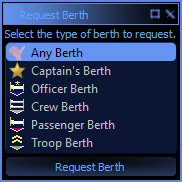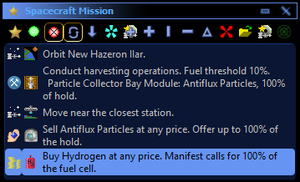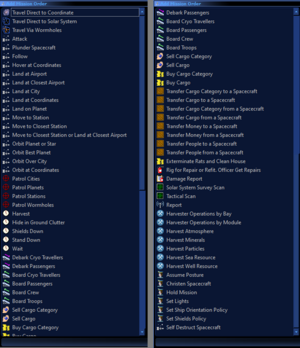Commanding a Spacecraft: Difference between revisions
m (→Captain) |
|||
| Line 66: | Line 66: | ||
*The big X will wipe the current mission. | *The big X will wipe the current mission. | ||
*The triangle will move an order up, and the vertical rectangle will insert a new mission above the selected one. The horizontal rectangle simply deletes the selected order. | *The triangle will move an order up, and the vertical rectangle will insert a new mission above the selected one. The horizontal rectangle simply deletes the selected order. | ||
*Missions can be made [[File:Cycle.png|16px]] Cyclic or [[File:DoOnce.png|16px]] Do Once. Cyclic means completed orders are moved to the bottom of the queue, Do Once means completed orders are instead deleted. | |||
You can de-activate and activate the mission with the red and green buttons respectively. Orders are ignored if the mission is de-activated and the crew just holds position instead. | You can de-activate and activate the mission with the red and green buttons respectively. Orders are ignored if the mission is de-activated and the crew just holds position instead. | ||
Revision as of 13:24, 14 March 2024
Spacecraft are a central feature of the game. They enable players to travel among the stars to explore, trade cargo, transport passengers, and wage war.
This guide describes how to command spacecraft that are crewed by non-player characters. NPCs already know how to operate each control station of a spacecraft.
Note: This topic does not describe the details of operating the various control stations of a spacecraft. If you need help with those, see the Category:Consoles page.
This also assumes you've manufactured at least a low-tech spacecraft at a spacecraft factory. If not, see the Building Your First Interstellar Colony guide.
Captain

The first step is to become Captain of your newly built ship. You must be aboard a spacecraft to become the captain. The spacecraft must not already have a captain.
To become the captain, open the Comm (F3) window. Select the Intercom channel. If necessary, open the Intercom channel using the list of standard channels.
Use the ![]() Request Berth button to request the captain's berth. The ship will automatically assign the captain's berth if it is available. The occupant of the captain's berth is the captain of the ship.
Request Berth button to request the captain's berth. The ship will automatically assign the captain's berth if it is available. The occupant of the captain's berth is the captain of the ship.
Note: You can also use the Spacecraft (F9) window's "Roster" tab to request the captain berth.
A spacecraft can have only one captain. Only avatars can occupy the captain's berth of a spacecraft.
Crew
You'll also need crew for the ship. Crew operate the systems of a spacecraft. Avatars and NPCs can both occupy these crew berths.
Many spacecraft can be operated solo, but this means doing everything manually which can be tedious. The pilot must know the details of operating every control console. This is a great way to learn how the systems of a spacecraft interoperate but the work load will keep the solo pilot running from station to station.
A competent crew reduces the task of operating a spacecraft to simply issuing orders.
Crew are loaded from cities. To load crew members, the ship must be landed in a city or it must be stopped within the service area of a space station. A ship equipped with transporters may load crew from cities in transporter range. The amount of crew available depends on if the ship is fleet or company owned and the buildings in the city. Fleet ships recruit crew from a star fleet academy or from a university, and company ships recruit crew exclusively from universities.
Note: The amount of homes in those buildings determines the amount of crew that will be available. Meaning if a university has 5 total homes, you'll only be able to board 5 crew at a time.
To load crew, use the Comm (F3) window, select the Trade channel and click the ![]() Load Crew button. This button is also used to load officers, troops, passengers and cryo travellers.
Load Crew button. This button is also used to load officers, troops, passengers and cryo travellers.

New crew members will start by moving to operate free control stations as soon as they are aboard.
You can also use the Unit Orders (Shift+F3) window to issue orders to the individual crew members or change their equipment.
Officers
A spacecraft can also have one or more officers, regardless of whether it has a captain. Officers can be avatars or NPCs. If a ship is to have an officer, it must be designed with one officer berth. Additional officer berths will accommodate more officers. Make sure to check that the design you built has at least one spare if you intend to board your homeworld's officer.
NPC officers are loaded from cities just like crew members. Ships recruit officers from star fleet academies, and universities. However, each habitable world only deploys one NPC officer at a time, making them a precious resource. Frontier worlds, those in the inner or outer orbit zones, do not produce NPC officers, even if they have habitable environments.
See the mission section below for why you'd want an officer.
The Con

An NPC officer is the officer in command when they have the con. The con is a symbolic token held by the officer in command. The officer in command executes the mission of the ship. While it is possible to give the con to more than one officer at once, only one of them actually commands the ship.
The Unit Orders (Shift+F3) window is used to give an officer the con and to revoke the con. It also shows which officers have the con.
Note: Sometimes, a boarded officer may not be given the con automatically and so they will not execute missions until remedied. Tip: Avatars in the chain of command of the ship always have the authority to execute mission orders so they do not hold or maintain a token representing the con.
Mission


The mission of a spacecraft is a list of mission orders. You can access the interface from the Spacecraft (F9) window's Mission tab.
As mentioned above, orders allow you to simply instruct your crew to perform ship-based tasks for you, so you don't have top manually pilot everywhere.
The top order in the list is the current order. Your ship's members will execute the current order.
Buttons
- You can use the blue "flower" button to add new orders, and also the + button.
- The big X will wipe the current mission.
- The triangle will move an order up, and the vertical rectangle will insert a new mission above the selected one. The horizontal rectangle simply deletes the selected order.
- Missions can be made
 Cyclic or
Cyclic or  Do Once. Cyclic means completed orders are moved to the bottom of the queue, Do Once means completed orders are instead deleted.
Do Once. Cyclic means completed orders are moved to the bottom of the queue, Do Once means completed orders are instead deleted.
You can de-activate and activate the mission with the red and green buttons respectively. Orders are ignored if the mission is de-activated and the crew just holds position instead.
The star button is used to mark the current order as done. You can do this manually, but it's much more common for an NPC officer to do this instead. This is because when the NPC officer determines that the current order is complete, it will be marked as complete automatically. This makes officers invaluable for big missions, so it's good to get one for this reason.
The other buttons are related to importing and exporting missions, which you won't need if this is your first ship.
Chain of Command
Chain of Command enables avatars to control spacecraft without occupying a berth aboard those spacecraft. All avatars in the chain of command of spacecraft have authority over those spacecraft.
Chain of command enables one avatar to command several spacecraft. It also enables one spacecraft to be commanded by more than one avatar.
- In an arena, everyone on the same team as the spacecraft is in its chain of command.
- Captains and officers on the roster of a spacecraft are in its chain of command.
- Everyone is in the chain of command of a ship with no captain's berth and nobody holding the captain's slot, regardless of empire. A spacecraft with no berths has only a captain's slot. Such spacecraft are typically utility shuttles. When a spacecraft with only a captain's slot has no captain, all players are in its chain of command.
- Owner is in the chain of command of all of their company ships.
- Everyone is in the chain of command of a company ship with no captain or officers, regardless of empire.
- The chain of command of the officer is also in the chain of command of the ship, on ships with an officer, whether company or fleet.
- Governors who have dominion over the ship's current location, on fleet ships with no officer, are in the ship's chain of command.
Officers have a chain of command.
- In an arena, everyone on the same team as the officer is in its chain of command.
Officers accept orders from all players in their chain of command. The captain and other human officers of their ship are in their chain of command. In addition, officers are in the chain of command of all the players who govern their home world. That means, they will take orders from the ship's captain, human officers, their home world's administrators.
Officers monitor comm channels aboard their ship for communications, regardless of whether they have the con. Officers monitor the Fleet channel, the Hail channel, the Crew channel, and temporary channels opened to them. The crew monitors the Crew channel, regardless of the presence of an officer.
If you issue a mission order to your crew over the comm, the officer aboard will take the con if he doesn't already have it. The officer will notify you of this, in his reply. This is necessary to carry out your orders.
Use the Comm (F3) window to broadcast a Hail message on the Fleet channel to contact fleet spacecraft. Each fleet spacecraft in range will open a separate channel to you with the name of the spacecraft. Use the Fleet channel to issue orders simultaneously to all fleet spacecraft. Use individual channels to communicate with individual fleet spacecraft.
Use the Comm (F3) window to broadcast a Hail message on the Company channel to contact company spacecraft. Each company spacecraft in range will open a separate channel to you with the name of the spacecraft. Use the Company channel to issue orders simultaneously to all company spacecraft. Use individual channels to communicate with individual company spacecraft.